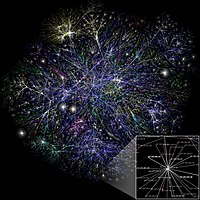
Photo from wikipedia
We report on the exact treatment of a random-matrix representation of a bond-percolation model on a square lattice in two dimensions with occupation probability p. The percolation problem is mapped… Click to show full abstract
We report on the exact treatment of a random-matrix representation of a bond-percolation model on a square lattice in two dimensions with occupation probability p. The percolation problem is mapped onto a random complex matrix composed of two random real-valued matrices of elements +1 and -1 with probability p and 1-p, respectively. We find that the onset of percolation transition can be detected by the emergence of power-law divergences due to the coalescence of the first two extreme eigenvalues in the thermodynamic limit. We develop a universal finite-size scaling law that fully characterizes the scaling behavior of the extreme eigenvalue's fluctuation in terms of a set of universal scaling exponents and amplitudes. We make use of the relative entropy as an index of the disparity between two distributions of the first and second-largest extreme eigenvalues to show that its minimum underlies the scaling framework. Our study may provide an inroad for developing new methods and algorithms with diverse applications in machine learning, complex systems, and statistical physics.
Journal Title: Chaos
Year Published: 2022
Link to full text (if available)
Share on Social Media: Sign Up to like & get
recommendations!